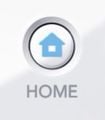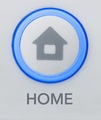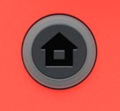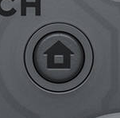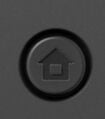Home button: Difference between revisions
No edit summary |
|||
| Line 19: | Line 19: | ||
==In ''[[Super Smash Bros. Ultimate]]''== | ==In ''[[Super Smash Bros. Ultimate]]''== | ||
On the Nintendo Switch, pressing the Home Button suspends the software, and takes the player to the Switch's Home Menu, where they can do things like access the eShop, or view their friend list. Unlike previous games, the Home Menu can be accessed at any time, even while online. Additionally, the player can do anything that doesn't involve closing a game without closing ''Ultimate''. | On the Nintendo Switch, pressing the Home Button suspends the software, and takes the player to the Switch's Home Menu, where they can do things like access the eShop, or view their friend list. Unlike previous games, the Home Menu can be accessed at any time, even while online. Additionally, the player can do anything that doesn't involve closing a game without closing ''Ultimate''. As of Nintendo Switch hardware version 8.0.0, quickly pressing the Home Button twice activates the Zoom feature. In this mode, pressing the [[X button]] with zoom in and pressing the [[Y button]] will zoom out. Players can adjust the position of the zoomed in screen by using the [[Control stick]], and pressing the Home bautton once will lock the screen in its new orientation. Pressing the Home button again will allow the screen to be adjusted again. Quickly pressing the Home button twice again will cancel the mode and return the screen to normal, but the prior orientation will be saved for when it is used again. | ||
==Gallery== | ==Gallery== | ||
Revision as of 18:00, December 15, 2021

The Home Button refers to a circular button for the Wii Remote, the Wii Classic Controller, the Wii U GamePad, the Wii U Pro Controller, the Nintendo Switch Joy-Con the New Nintendo 2DS XL, and the Nintendo Switch Pro Controller, or a rectangular button beneath the touch screen on the Nintendo 3DS. (Although, the home button is oval shaped on the New Nintendo 3DS and it's XL variant.) Its color depends on the that of the controller. The Home Button does not have any specific gameplay function; instead, it is used to access the console's Home menu while suspending the currently-running software. Within Brawl and Smash 4, there are certain cases where the Home menu cannot be accessed, primarily in modes involving Wi-Fi, as well as during loading sequences.
In Super Smash Bros.
On the Wii Virtual Console, the Home Button will allow the player to either restart the game, go back to the Wii Menu, or to modify some settings of the Wii Remote; the lattermost property is important in tournaments, as the use of wireless controllers requires players to resync and desync controllers to and from the console which is the same as Brawl.
In Super Smash Bros. Brawl
On the Wii, the Home Button opens the Home Menu, which allows the player to either restart the game, go back to the Wii Menu, or to modify some settings of the Wii Remote; the lattermost property is important in tournaments, as the use of wireless controllers requires players to resync and desync controllers to and from the console.
While Melee can be run on the Wii, the Home Menu cannot be accessed while playing GameCube software.
In Super Smash Bros. 4
On the Wii U and 3DS, pressing the Home Button again suspends software, but it now sends players to the standard Home Menu of either console; from here, it is possible to use some multitasking applications, as well as manually close the game.
On the Nintendo 3DS, features in the Home menu include changing the operating system's visual theme, seeing registered friends as online or offline, drawing notes for future reference, seeing notifications sent from Nintendo or specific software, accessing the Internet via a web browser, and access to Miiverse. Due to the high amount of RAM required to run Super Smash Bros. for Nintendo 3DS, users cannot use the Internet Browser or access Miiverse if they use a 3DS, 3DS XL, or a 2DS; the improved system hardware of the New Nintendo 3DS line does allow for these two functions to be used while playing Smash 4. As a result, only players with a New 3DS could post screenshots to Miiverse while playing Smash 4, though both the New 3DS and regular 3DS lines could upload saved screenshots.
On the Wii U, the Home menu can be used to pair controllers such as Wii Remotes and enable or disable rumble, view online or offline friends, access Miiverse and the Nintendo eShop, browse the Internet, see notifications, check on the status of downloads, and check the instruction manual of the software currently in use. In some regions, the Home menu also allowed players to view television shows, but this service was later discontinued.
In Super Smash Bros. Ultimate
On the Nintendo Switch, pressing the Home Button suspends the software, and takes the player to the Switch's Home Menu, where they can do things like access the eShop, or view their friend list. Unlike previous games, the Home Menu can be accessed at any time, even while online. Additionally, the player can do anything that doesn't involve closing a game without closing Ultimate. As of Nintendo Switch hardware version 8.0.0, quickly pressing the Home Button twice activates the Zoom feature. In this mode, pressing the X button with zoom in and pressing the Y button will zoom out. Players can adjust the position of the zoomed in screen by using the Control stick, and pressing the Home bautton once will lock the screen in its new orientation. Pressing the Home button again will allow the screen to be adjusted again. Quickly pressing the Home button twice again will cancel the mode and return the screen to normal, but the prior orientation will be saved for when it is used again.
Gallery
The Home Button on the Wii Remote
On the Wii U GamePad
On the Joy-Con (R).
Trivia
- When the home menu is activated in Brawl, the current music will be muted, but continue to play in the background; in other words, when returning to the game, the music will proceed as if it were continuously playing rather than picking up from where it was paused.
| Controllers and buttons | |
|---|---|
| Nintendo 64 controller | |
| GameCube controller | |
| Wii Remote (and Nunchuk) | |
| Classic Controller | L |
| Nintendo 3DS | |
| Wii U GamePad / Pro Controller | L |
| Joy-Con | |
| Switch Pro Controller | L |
| Third-party controllers | Hori Mini Pad · Arcade controller · Keyboard |
| Other | Smash Controller · Controller modification |
